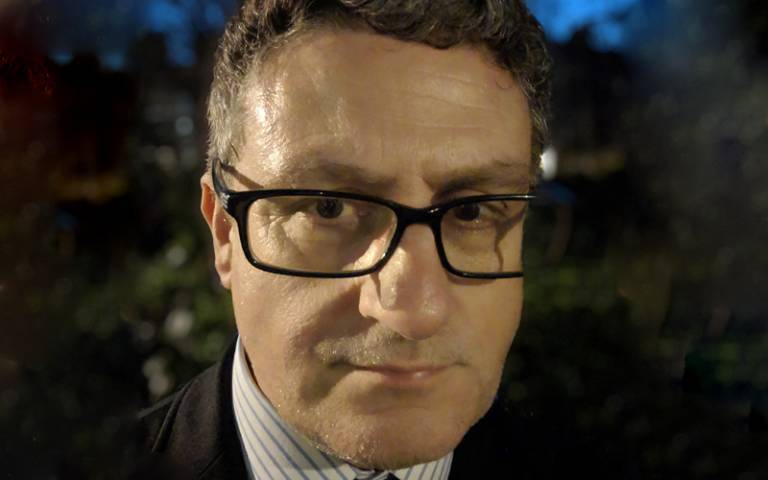Opinion: The West needs to prepare for guerrilla war in Ukraine
13 March 2022
The West has pledged its support to Ukraine with promises of weapons and other aid but now it needs to consider exactly what this means, says Professor Mark Galeotti (UCL School of Slavonic & East European Studies).

Russia's deputy foreign minister Sergei Ryabkov warned this week that convoys of weapons being sent to Ukraine would be considered legitimate military targets by Russia. It was a deliberately ambiguous and political statement more than anything else, but it is also a useful reminder of the need to think about the potential next phase in the war.
It is still unclear whether the Russians will be able to recover from their unimpressive initial onslaught, but one way or another it seems likely that at least part of Ukraine will end up under Moscow’s control. It also seems pretty certain that Ukrainians behind the lines will not quietly submit, but instead wage a partisan war against the occupiers.
The West has made it pretty clear that it is committed to supporting any such resistance with weapons and other aid. If, as and when that happens, then we need to be considering quite what that will mean.
Ryabkov claimed that ‘pumping Ukraine with weapons from several countries… turns the corresponding convoys into legitimate targets.’ In theory, that could imply cross-border strikes against convoys while they are still on Nato soil, but in reality that seems unlikely. Rather, it presumably means that the Russians would target them while they were on free Ukrainian territory or when they moved into an area Russia has claimed.
In Afghanistan, for example, while the Soviets did launch some incursions into neighbouring Pakistan to try and interdict incoming supplies for the mujahedin rebels, they generally unleashed their Spetsnaz special forces and ‘free hunting’ attack helicopters and aircraft to attack convoys inside the country.
But as far back as 2014, Moscow has demonstrated a willingness to unleash more covert mayhem. At that time, Ukraine was in disarray and desperately trying to rebuild its military capabilities. A Bulgarian arms dealer, Emilian Gebrev, arranged to sell the Ukrainians munitions that were stored at an arms depot in Vrbětice, a village in the east of the Czech Republic. Operators from Unit 29155, the sabotage and assassination element of GRU, Russian military intelligence, planted bombs at the Vrbětice depot. They went off prematurely, killing two civilians, but also disrupted the deal – and next year, they tried to poison Gebrev, too.
Putin has hardly become less willing to take risks and ignore international norms since then. It is certain that, even if he is not going to launch the kind of overt attack on Nato soil that would trigger the Article 5 mutual defence guarantee, he would unleash his covert attack dogs.
This will obviously be a security challenge that will demand a high level of vigilance, especially as counter-intelligence sources suggest the Russians still have ‘sleeper’ assets in Europe (although this is nothing like as common as one would think from TV and film). So it is not necessarily the case that agents would have to find some way across an increasingly closed set of borders to test the West’s defences.
This is also a political challenge worth addressing now. The odds are that both Moscow and Nato would not want to let such attacks escalate from sabotage to open war, but the Kremlin may be counting on the West grinning and bearing a certain level of covert mayhem. This may, alas, be the case but it would be worth reaching some prior agreement within Nato on a menu of responses to such attacks and signalling that to Moscow in the hope of deterring adventurism.
There is precious little scope for further economic sanctions, and direct tit-for-tat is almost certainly off the table. This might, though, be an opportunity to use the West’s undoubted and so far still underused offensive cyber capacities to target Russian systems that are directly and exclusively related to the military or security agencies or the political leadership. Even seemingly trivial activities such as triggering fire sprinklers during a sitting of Putin’s compliant parliament is a signal of capabilities that could be used much more seriously. Wiping reservists’ records from Russian databases would also seriously affect the military’s opportunities to replenish its forces.
The point is that the West needs to be thinking about this now, setting up whatever security measures are possible in advance and preparing a proper and united response. Otherwise, as usual, we will be making it up as we go along.
This article first appeared in The Spectator on 13th March.
Links
- Original article in The Spectator
- Professor Mark Galeotti’s academic profile
- UCL School of Slavonic & East European Studies
- UCL Social & Historical Sciences
 Close
Close

